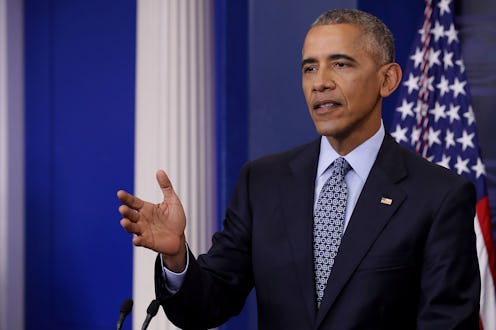News
This Was Obama's Syria Policy

"When dictators commit atrocities, they depend upon the world to look the other way until those horrifying pictures fade from memory." This reads like something U.N. Ambassador Nikki Haley might have said following the chemical bombing of Khan Sheikhoun on Tuesday, a defense of U.S. retaliation against Syria. But these are, in fact, the words of President Obama about his Syrian policy, from a 2013 national address delivered in the aftermath of an earlier chemical attack sanctioned by Syrian President Bashar Al-Assad. Unlike President Trump, though, Obama did not carry out his stated intention of military strikes, an indication of the complicated nature of Obama's Syria policy.
In 2012, Obama stated that the use of chemical weapons would constitute a "red line" for the United States, and that if Assad crossed that line, "there would be enormous consequences." At that point, the civil war in Syria had been under way for two years. Peaceful protests calling for Assad to step down had rapidly escalated to full-blown civil war. But while government officials may have known the capacity of Assad for brutality, average Americans likely did not. "Caesar" — the code-name for an escaped Syrian photographer — had yet to present his evidence of Assad's systematic torture and murder of thousands of arrestees. The death toll was nowhere near the 470,000-plus it stands at today.
That may in part explain why Americans, and their representatives in Congress, balked at the idea of retaliating against Syria in 2013. Perhaps war weariness played an even bigger role in the widespread opposition to even minimal involvement in "another" Middle East conflict. The United States had spent over a decade fighting in Iraq and Afghanistan, neither of which were clear victories. Facing a difficult vote for authorization to use force in the House and Senate, the Obama administration pivoted to a diplomatic solution.
The lead-up to that outcome and its subsequent results are not widely viewed as successes. For those who did advocate military intervention, the administration's public commentary was sometimes deemed confusing or even counterproductive. In Secretary of State John Kerry's words, proposed airstrikes would be "unbelievably small," a bizarre way of defending meaningful intervention.
In lieu of striking Syrian targets, Obama agreed to let Russia lead the removal of chemical weapons from Syria as a compromise solution. In a sadly prescient critique of that decision, Sens. John McCain and Lindsey Graham said at the time, "Assad will use the months and months afforded to him to delay and deceive the world," arguing that the agreement was "the start of a diplomatic blind alley."
That appears an accurate prediction. Though all of Assad's chemical weapons were reported as successfully removed, Tuesday's attack proves otherwise. And with the failure of several ceasefires — many of them disintegrating within hours — there has been no end to the fighting in Syria.
U.N. Ambassador Samantha Power, appointed by Obama, leveled criticism at Syria, Russia, and Iran for their role in the deaths of so many civilians. Speaking at the U.N. on the destruction of Aleppo in December, Power asked, "Is there no act of barbarism against civilians, no execution of a child that gets under your skin?” But years of precedent all but guaranteed that while Obama and his administration condemned the horrors of Syria's civil war, they would not involve America's military against Assad.
Complicating matters further is the rise of ISIS, a terror group that has moved into parts of Syria. Drawing on authority granted to the president after 9/11 to take on al Qaeda, Obama and Trump have ordered bomb strikes against ISIS in Syria. That's fundamentally different than sanctioning airstrikes against the official Syrian military, which Obama argued would require congressional approval.
Obama's unwillingness to combat Assad has been met with growing criticism. His argument that any airstrike would require congressional approval is weakened by the fact that he ordered military attacks on Moammar Gaddafi in Libya. And while the outcome of striking Assad back in 2013 is impossible to know, it is hard to imagine how the situation could be much worse. Millions of refugees have fled to Europe and surrounding countries, some of which are not financially equipped to host them. Nearly half a million Syrians have been killed in the fighting, tens of thousands of them children.
The Obama policy on Syria seemed to be one that advocated vocally condemning the heinous crimes committed by Assad, while remaining steadfastly opposed to military intervention. Its result has been an ever more chaotic and deadly Syria.